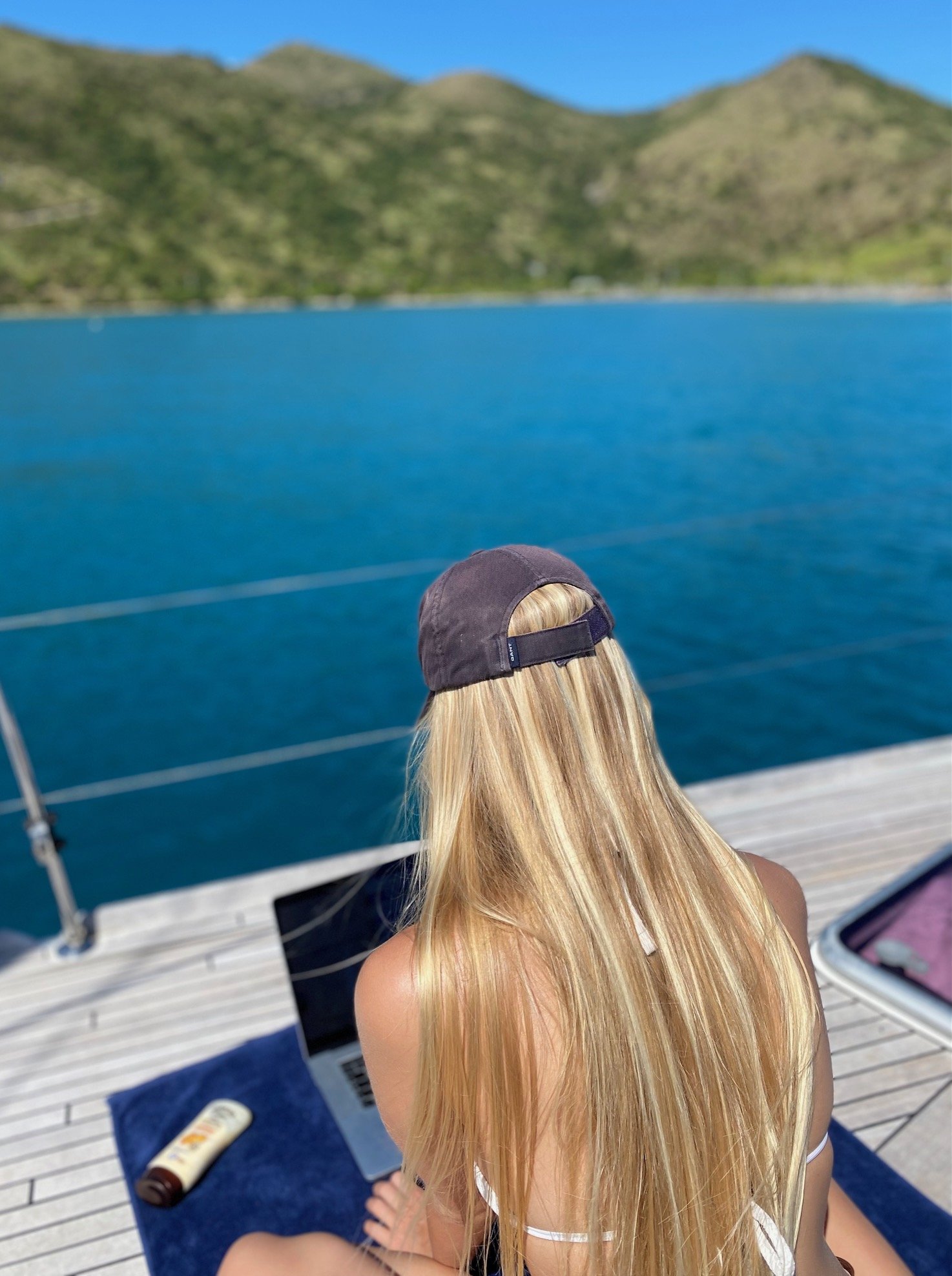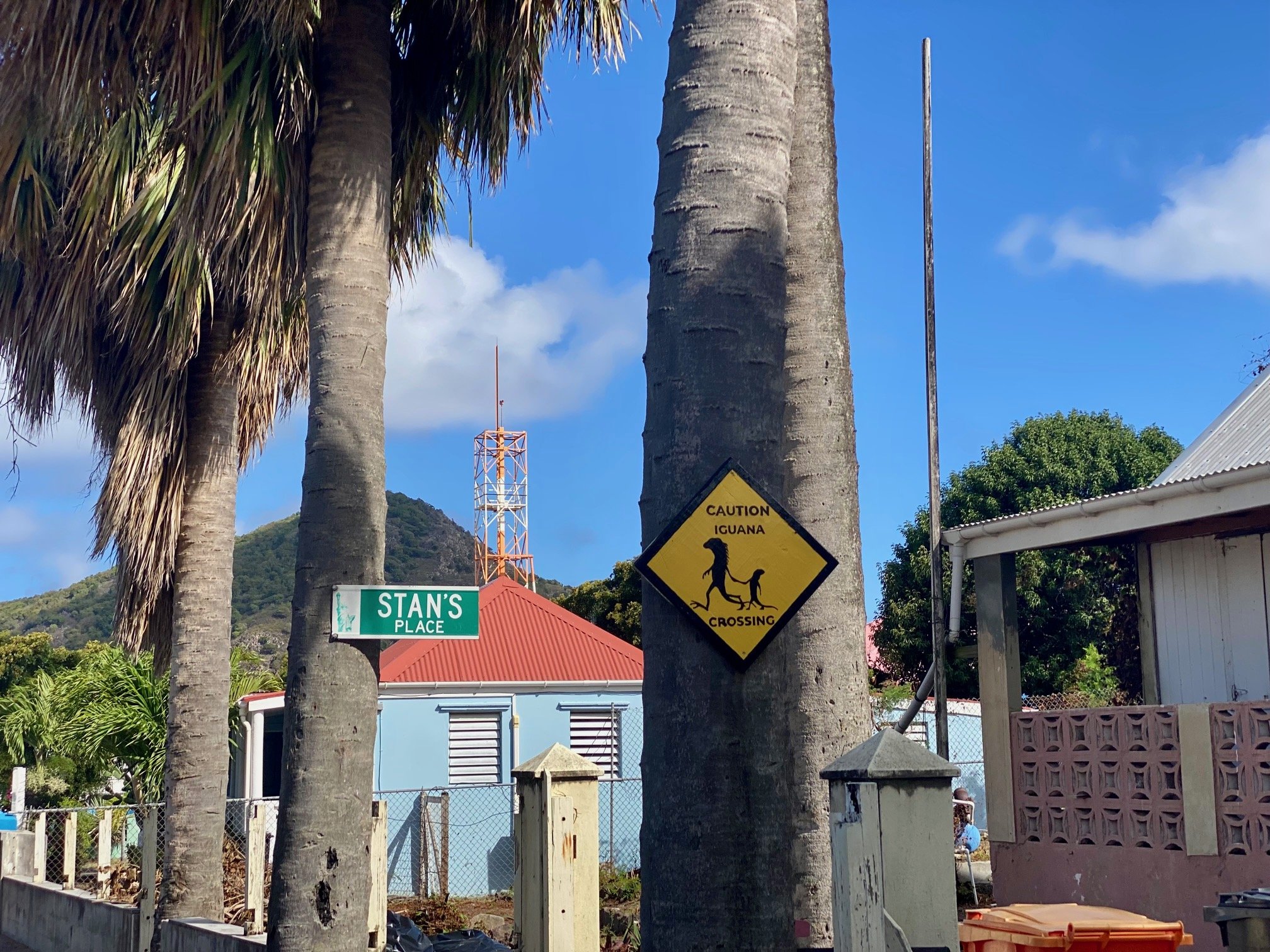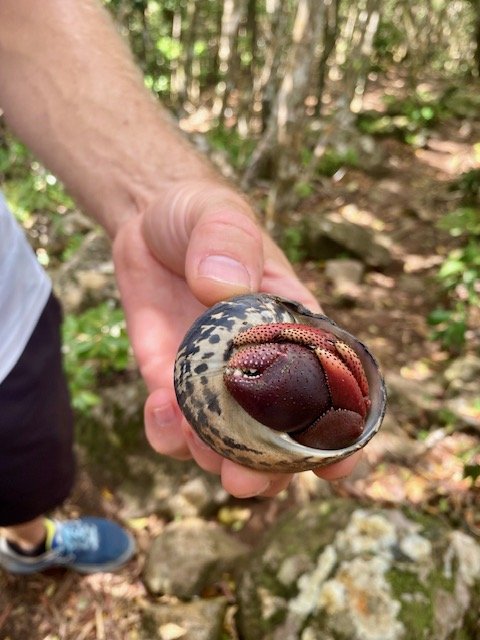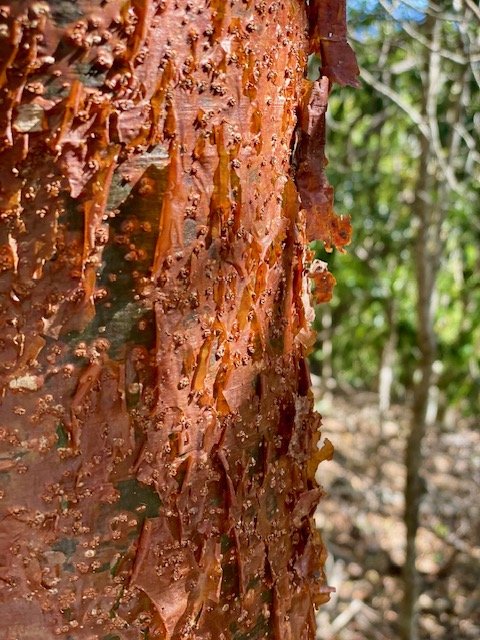In the virtual classroom
Our kids usually dial into class.
Off Sint Eustatius we experience what we have feared before starting our tour and almost forgotten. In Oranjestad Bay, the Asja rocks in front of an idyllic backdrop of a fortress and a volcano - but we have no network. Our children cannot dial into their online classes. This has actually always worked even in the middle of the Atlantic thanks to Starlink. But in Statia, as everyone calls the "special municipality of the Netherlands", the satellite service does not have a license.
"I have physics soon... I definitely don't want to miss that," says Stella. But neither our mobile data nor the SIM card that Daniel buys can cover the amount of data that the lessons consume.
We shorten our time on the island, do some digital detox. And at our next stop in Gustavia, St. Barth, I explain our kids’ absence to the class teachers.
At the dinghy dock.
Germans and compulsory school attendance
"How do you deal with school?" is a question all Germans ask us during our journey. Because of the strict compulsory schooling, people from our country find it quite astonishing that teenagers attend lessons outside of a school building.
After its introduction in 1717 by King Friedrich Wilhelm I, who wanted "skillful and better subjects", compulsory schooling has been enshrined in the German constitution since 1919. And of course the increase in education has advanced society. But how does this strict compulsory schooling fit into the 21st century?
Parents in other countries can answer this question for themselves. In Austria, Canada, the USA and Australia, for example, they can teach their children at home or enroll them in online schools. Not in Germany.
I have heard - through a few channels - of German sailing kids who have been granted leave for the tour. But these are more likely to be elementary school students, on shorter trips, or after an initial “yes”, the commitments had been withdrawn by the school. The headmaster of our high school in Frankfurt, that calls itself a European school, showed no understanding whatsoever. We had no choice but to deregister in Germany.
Teaching yourself or online school?
We have had lots of discussions if we should teach our kids ourselves. With two children, it would have saved us more than 1,000 euros a month and would have given us more flexibility, for example when it comes to excursions.
During the ARC+, some parents turned their ships into floating schools. Fantastic. If you don't stick strictly to a curriculum, but focus on life on board and your route, you'll always find something to teach: taking and examining water samples, the geology of the islands, the difficult history of colonization. And it might add a lot to an older kids' perspective on their trip.
Daniel and I could have divided the subjects up well, but the time investment lecturing two high school kids made us decide against it. As did our children's desire not to repeat a school year, and therefore they wanted to spend a lot of time on lessons.
In the capital city of Oranjestad, which has a population of 1,000, time has stood still.
Subsequently, we looked into German-speaking online schools. As expected, the range is extremely small, but there are a few options. They aim primarily at the children of German expats and digital nomads abroad. But also neurodiverse young people who cannot easily be forced into a one-size-fits-all attendance scheme. Young athletes who spend a lot of time competing and kids of families for whom attending a "normal" school is out of the question.
Since September 2024, Stella and Louisa are enrolled at the Wilhelm-von Humboldt Online Private School, which is based on the Baden-Württemberg curriculum. Founded in 2019 by Sascha and Lars Berner, the school currently has 324 students in 45 countries, supervised by 60 teachers.
At the start of our tour, in Europe, Stella and Louisa had school in the afternoon. Now in the Caribbean, they log into the virtual classroom at 9 a.m. The lessons - and communication with teachers - run via Microsoft Teams. A platform that we as Apple users had to get used to.
Content-wise, the lessons remind me of a productive Zoom call. Or of school as it could have been during Covid times, if we had been prepared for it in Germany. The classes are smaller. There is no obligation to turn on the camera. Our children take part in clubs, such as the school newspaper or the choir. There are parties and lectures, everything is virtual.
When we are offline, we go hiking.
The lesson buffet
“Be quiet, I’m writing an English test!”, calls Louisa on the journey from Guadeloupe to Antigua. Our sensor has broken down, but according to Windy we have 20 to 25 knots of wind. Maybe more. We are steering our ship through 2 meter high waves. Salt water is lapping over the bow and the helm and of course we are heeling. It is not easy to sit at the computer in the salon now. Let alone write a class test.
Tests are a particular challenge at an online school: The teachers cannot control whether the children are looking at their notes or if they ask ChatGPT. The results are based on trust, as is attendance at the class. As Stella’s teacher Herbert Utz explains it as follows:
“School is like a buffet the parents pay for. You can help yourself or not. Students who do not help themselves should discuss with their parents whether it is okay for them. If they miss class a few times, we talk to the parents.”
This level of personal responsibility is certainly not the right choice for every child, but it works for our two. They take their lessons seriously and do their homework with more discipline than in Frankfurt.
At the Online school, they have grades and reports. It is not yet clear whether Stella’s and Louisa’s next school will accept them. But that is not giving us sleepless nights.
The purple trail leads up to the Quill.
Physical education instead of physics
Back to Statia. The island, which also calls itself “the golden rock”, was a trading hotspot in the Caribbean in the 18th century. Hundreds of ships were anchored off Oranjestad. Today, it is hard to imagine, as only a handful of sailors and divers are drawn here.
It is not comfortable. Especially for a monohull, because there is an insane swell in the anchorage off Oranjestad. Our ship is rolling nonstop, sometimes it is bearable, the next moment you feel like you are on a roller coaster. We spend as much time as possible on land, where it is so tranquil that you feel like you have been transported back to the 20th century. The people are friendly and helpful. We rent a car from Sebastiaan from Statia Car Rental, go shopping, and fill up the bilges. For a short volcano walk, we drive to Mountain Crab Road.
Watch out, soldier crabs are pinching
From there, we hike up the Quill, a dormant volcano. At 600 meters, it is the second highest mountain of the Netherlands. The path, marked with a purple natural matryoshka, starts in the sun-scorched bushland. It goes uphill quickly. The higher we climb, the bigger the trees become and give us some shade. Lizards dart across the paths. Large hermit crabs, a.k.a soldier crabs, wander into the undergrowth: these are strange animals that breathe air, but have to go into the sea to lay their eggs. Otherwise they live on the volcano and pinch you with their claws if you pick them up and aren't careful. Like Louisa.
Rubber tree on the Quill.
Reaching the summit, we take the light blue Mazinga Trail that leads over the heights. It is a well maintained track. Ropes provide more stability in steep places. On a few rocks with a view, we share a pack of biscuits and look into the volcanic crater, which is lushly overgrown with rainforest.
It’s a perfect offline day, at least for me. At 15, it's perhaps more like a day one survived without Snapchat and school. Sometimes, during this trip, we experience so many new, unexpected things that we have to put into context. What is really important to me - and to us - and what can I - can we - do without? Pursuing questions like these is not school in the traditional sense, but incidentally, we learn a lot about ourselves.
Idyllic anchorage in the shadow of the fort and the volcano
Statia is a charming island where time seems to have stood still
A hike up the Quill volcano is interesting because of the different vegetation zones and is suitable for all fitness levels. The trails become a bit more challenging once you are at the top
You can leave the dinghy on the jetty near the customs
Strong swell. When we were in Statia, it was so rolly that we could hardly sleep.
Amazing views on the Mazinga Trail.







